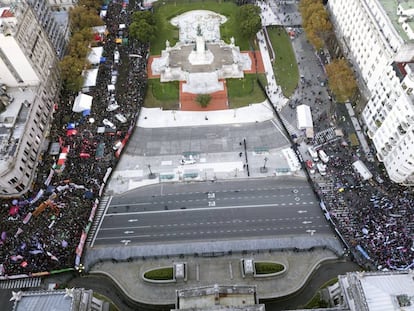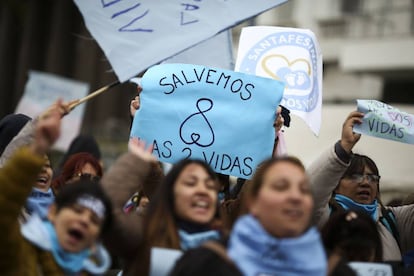Argentine Chamber of Deputies votes in favor of legalized abortion
The draft law that will allow for terminations up to the 14th week will now have to pass the more conservative Senate


Legal abortion has won in Argentina’s parliament and in the streets of Buenos Aires. In a vote that has deeply divided society, and that ran for more than 20 hours, legislators on Thursday approved a draft law that will allow for voluntary terminations by a total of 129 votes in favor, and 125 against.
The night before the vote, a long row of barriers was put up to separate the protesters against the measure from those who want abortion to be made legal, safe and free. Outside the Chamber of Deputies, on one side of the square, thousands of teenage girls burst into cheers, applause and tears on hearing today’s news. On the other, the few detractors of the law that were still left started to file out with their heads hung low.
Few could have imagined that three months previously, when the Argentine President Mauricio Macri decided to table the debate, that the legalization of abortion would be passed in at least one of the houses of parliament. Now the law will have to pass to the more conservative Senate. All signs suggest that the legislation will flounder there, but nothing is certain in an Argentina that is currently enjoying a wave of feminism, one that has made legal abortion one of its key demands.

The proposed changes would make it legal for a woman to have an abortion before 14 weeks. Under the current law, a pregnancy can only be terminated if it poses a risk to the life of the mother, if the fetus is malformed and in the case of rape. If a woman breaks the law she can be sentenced to between one and four years in prison.
Anti-abortion lawmakers had traditionally held the majority in Congress but their advantage has shrunk over the last few days. According to a count by gender rights organization Economía Feminista, the night before the vote, 119 legislators were in favor of decriminalizing abortion, 120 were against and two were planning to abstain. These numbers swayed in favor of decriminalization at the start of the vote but seven deputies were undecided.
Since the return of democracy to Argentina in 1983, there have been seven attempts to reform the law but none have been approved by Congress. When Cristina Fernández de Kirchner was president, Argentina became the first Latin American country to legalize same-sex marriage, in 2010, and pass a gender identity law, in 2012. But Kirchner did not support legalizing abortion.
Her successor, Mauricio Macri, has also opposed changes to the law but social pressure and the need to distract the country from its economic problems prompted him to allow the debate.
The social divide over abortion rights is visible even within the country’s political parties. While the left unanimously support the changes, the other political blocs are divided. For example, two-thirds of Mauricio Marci’s right-wing Let’s Change coalition oppose the law. In the Front for Victory party, 53 out of 59 deputies are in favor. Luis Contiagiani, Argentina’s only socialist deputy, resigned from his party but not his post after he was heavily criticized for announcing he would vote against decriminalization.
Frente Renovador deputy José Ignacio de Mendiguren, who had previously kept his vote secret, announced that his vote would be in favor of the new law moments before entering the Chamber. “I made this decision alone. I traveled across the country and I must take into consideration the situation in the country. A woman’s decision is final, they do not decide it based on the criminal code. And when they decide, they are alone. An abortion can cost 20,000 pesos and they cannot pay for that,” he said.

Mayra Mendoza, a legislator of the Victory Front had said she would vote in favor of the changes. “There is a revolution from our daughters that is here to stay. We must be remembered by history as progressives who secured the rights of our people, not as those who voted against women. We must guarantee the human right to public health,” she argued.
Outside of the Chamber, protesters in favor of decriminalizing abortion outnumbered those against. Tens of thousands of people, most of them young women, gathered carrying signs with messages such as “My body my choice,” “Get your rosaries out of our ovaries,” and: “Everybody for legal abortion.” The protesters wore green and used green makeup to show their support for decriminalization.
Protesters against the changes wore teal. Most were fathers and mothers with their children, who were joined by monks and nuns. Waving Argentine flags and pink balloons, the crowd chanted: “Yes to life, no to abortion.” The fence separating them was covered with drawings from children, showing fetuses asking their mothers to be put up for adoption and not to be “murdered.” The anti-abortion protesters held prayers and even performed live ultrasounds in an attempt to prove that the heartbeat of a fetus could be heard.
Throughout April and May, more than 700 speakers in favor and against legal abortion presented their arguments to Congress. Some women shared their abortion stories, while obstetricians, psychologists, writers, film directors and celebrities also spoke out.
Claudia Piñero, a famous novelist, argued in favor of the right to choose and called on deputies not to let others “steal the word life” in a moving speech that was retweeted thousands of times. Health Minister Adolfo Rubinstein, meanwhile, pointed out that maternal mortality rates are lower in countries where abortion is legal.
The current debate has broken the taboo on abortion in Argentina, with hundreds of women confessing for the first time that they have terminated a pregnancy. According to estimates, cited by Rubinstein, between 350,000 and 450,000 women have an abortion each year in Argentina. In 2016, 47,000 mothers required hospital care due to complications in their pregnancies and 43 died.
Those who want abortion to be legalized argue it is “about public health, not about religious beliefs,” and want to prevent more deaths from underground abortions. Those who oppose argue “abortion is not a solution. Let us save two lives.”
English version by Andres Cayuela.
Tu suscripción se está usando en otro dispositivo
¿Quieres añadir otro usuario a tu suscripción?
Si continúas leyendo en este dispositivo, no se podrá leer en el otro.
FlechaTu suscripción se está usando en otro dispositivo y solo puedes acceder a EL PAÍS desde un dispositivo a la vez.
Si quieres compartir tu cuenta, cambia tu suscripción a la modalidad Premium, así podrás añadir otro usuario. Cada uno accederá con su propia cuenta de email, lo que os permitirá personalizar vuestra experiencia en EL PAÍS.
¿Tienes una suscripción de empresa? Accede aquí para contratar más cuentas.
En el caso de no saber quién está usando tu cuenta, te recomendamos cambiar tu contraseña aquí.
Si decides continuar compartiendo tu cuenta, este mensaje se mostrará en tu dispositivo y en el de la otra persona que está usando tu cuenta de forma indefinida, afectando a tu experiencia de lectura. Puedes consultar aquí los términos y condiciones de la suscripción digital.








































